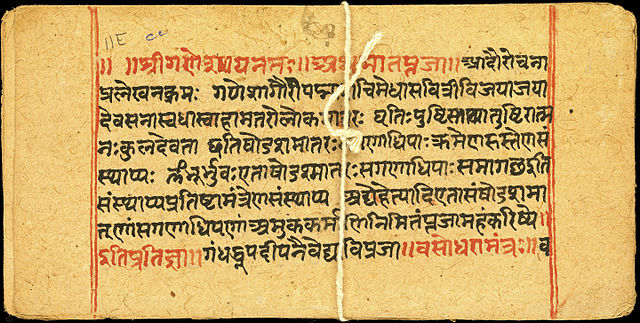Needless to say, Artificial Intelligence is the future of our technology. But this does come with a lot of criticism, research, and arguments about how to develop the most suitable computer language to upgrade the existing level of Artificial intelligence.
Recently, the news speculating around many prestigious tech-science circles is that NASA has made an incredible discovery about computing language for Artificial intelligence. According to research, NASA claims that Sanskrit – the ancient Hindu language – is the most suitable language to develop computer programming for their Artificial Intelligence program.

Sanskrit has always been an important language in intellectual communities. Despite its ancient origin, the language has some amazing characteristics that are considered helpful in different fields. It is also used for therapy sessions in psychology and for spiritual remissions. But its recent involvement with artificial intelligence is an honor proving its power for being a valuable course of literature.
Sanskrit has a rich history and was used for early Indian mathematics and science. The grammar of Sanskrit is rule-bound, formula-bound, and logical, which makes it highly appropriate to write algorithms.
The grammar also makes Sanskrit suitable for machine learning and even artificial intelligence. For historians and regular folks, the possibility of using Sanskrit to develop artificially intelligent machines is inspiring because it exploits the past innovatively to deliver solutions for the future.
Vedic Science by Rick Briggs: The Origin of NASA Sanskrit Relation
NASA Sanskrit relation is not new. It all began in 1985 when a NASA associate scientist published a research paper in the spring issue of Artificial Intelligence magazine. (Volume 6 Number 1). The name of the scientist was Rick Briggs who submitted his research entitled as Vedic Science- ‘Knowledge Representation in Sanskrit and Artificial Intelligence.’
The article argued about Natural languages being the best option to be converted into the computing program for robotic control and Artificial Intelligence technology. The research focuses on Sanskrit among the pool of many human languages, explaining that it is one of the most suitable ones for computing techniques.
Although, a detailed discussion about this research paper is due in the article onwards, here is a summary in Rick Briggs’ own words derived from the same journal.
“There is at least one language, Sanskrit, which for the duration of almost 1,000 years was a living spoken language with a considerable literature of its own. Besides works of literary value, there was a long philosophical and grammatical tradition that has continued to exist with undiminished vigor until the present century. Their grammar experts devised a method for paraphrasing Sanskrit in a manner that is identical not only in essence but in form with current work in Artificial Intelligence.” – Rick Briggs’ statement on Sanskrit language
Details Presented in the Research Paper
In this detailed research paper, Brick Riggs presented many ideas and derived outcomes about the development of artificial intelligence (during that time) and how natural languages can be implied and converted into a machine language.
Following are some of the phenomenon he shed light over
Natural Language Conversion into Machine Language
NASA had been researching over this matter from longer than two decades. A lot of money, time and resources had been invested. The outcomes favor the integration of a language that can be converted into machine computing to enhance Artificial Intelligence efficiency.
This is what the report says:
The phrase above indicates NASA’s intense interest in Sanskrit and the research is authentically done by NASA over many levels. However, the paper was published in 1985 which is almost more than 20 years ago, yet it is a common fact that NASA’s research is often prolonged over decades to derive official results.
Currently, NASA is also working over Artificial Intelligence for space communications which is clear proof that the topic of “Artificial intelligence Development” was never closed in NASA.

Challenges for Computer Language Conversion
Despite the positive outcomes, there are multiple challenges that should be kept into consideration. First is the ambiguity of any natural language which means that the words which form a sentence in a natural language can behold multiple meanings. It should be able to convert the language in such a way that it reduces the ambiguousness, making it more literal so that robots with artificial intelligence could understand it is a challenge.
The accuracy of linguistic analysis is a very important factor, but it is difficult for AI.
For example, sarcastic statements are difficult to interpret accurately because understanding sarcasm requires emotional intelligence.
An expression like “That’s just what I needed today!” can be interpreted as either sarcastic or happy exclamation depending on tonal fluctuations and emotions expressed along with the statement.
Accurate linguistic analysis of statements with emotions and small tonal fluctuations requires the detection of the indicators. This is difficult for AI, particularly if the expression is conveyed via a microphone or read out loud by another person.
Yet, this is another reason why Sanskrit seems more suitable than other languages. The strict grammar rules, syllables, and words have reduced ambiguity making the literal meaning word and sentence. This definitely reduces the percentage of abstract meanings in the language.
The rationale behind these authors is based on language that had been developed primarily to form logical relations with scientific precision. This means that a logical relationship in the context of scientific precision can be easily developed with Sanskrit.

Counter Arguments by Critics
There are many scientists and intellects that doubt about this matter – the natural language conversion for AI technology. Most of them argue about Lisp which is the language of Artificial intelligence. They also claim that if the Sanskrit language is considered suitable, then software should have been written by now.
On the contrary, the majority of the scientists do believe that Sanskrit has many useful lessons and techniques that can be used for the development of a computing language, but the overall integration is quite difficult and nearly impossible.
NASA’s reaction over this is still due. A brilliant way to answer these critics would be an initial launch of software or at least a research program devoted to the cause. It must be publicized to make this research authentic.
Conclusion
NASA Sanskrit connection is an authentic one supported by an enormous amount of research and claims. Although there is no official statement by NASA and their approach for artificial intelligence which is clearly inclined towards natural languages, especially Sanskrit.
There can be a groundbreaking revelation by NASA in this regard in the near future. Until then, the mystery of Artificial Intelligence and its capability to be as human as possible remains unresolved.
Tell us what you think? Did you find this article interesting?
Share your thoughts and experiences in the comments section below.













Wonderful article,
I also started teaching Sanskrit to my daughter and in society
Excellent Article. Request to publish any further objective information on this topic .
I vaguely remember there was another African language which was also found to suitable as stated in 80s. If true,can you please check and publish? Thanks in advance.
Thanks for the feedback LN,
I can certainly look into the African languages that may impact the field of Artificial intelligence.
Excellent article and very happy to read the connection between Sanskrit and Artificial intelligence. Sanskrit grammar is very strong and crystal clear algorithms can be written. Very happy to read this article
Please read some basics of computers and algorithms.
You are right sir !
Very nice. Sanskrit becomes global language.
good joke…. it must be a joke of the year
How can you this joke? Please elaborate
Sanskrit is used only by a few groups of peoples to chant mantras and also Sanskrit never crossed India, … it’s not a people’s language and also a dead language now … so how this dead language becomes a global language? does it spoken by any people around the globe ? answer is no ..that’s why I said its a joke …
Ohh great to know that but your reason doesn’t give a proper explaintion that it’s a joke let me clear you some facts more than 80% of python and R develper now a days dont know what is Assembly Language if they know they cant code ML or Ai code with it. So I feel you made my day with your joke >_<.
nor english was used world wide , untill it became famous , we need to put efforts to make it global , it wont became global just by neglecting own culture and saying it is of no use
Sanskrit is very structured and analytical language. Almost all IITs, Sanskrit Bhrati and many Big and small organizations are teaching thousands of students all over the globe. Three German Univesties have Sanskrit Departemnets. Narendra Modi wants Sanskrit should become 2nd Language by 2040.
Mr. Bannerjee some time our world ends at what we know. Try to learn you will be in love with language.
It is the language of GOD You will find many free lessons on Google. Please respect the other languages.
Most of the scientific articles are published in English only. Already we are suffering in scientific advancement in all fields (medical, education, defence, etc). If we don’t learn English, we will be zero in scientific advancement. If we start learning Sanskrit to make global language, then the scientific advancement of our country will end in disaster.
Hello Rajan, thanks for your laziness to learn or accept Sanskrit language. everything around us is bound by sounds in that Sanskrit a language to express and their pronunciation makes it better and its grammar rich rules makes it crystal meaning which will never change over the time (centuries). This is the language so far known to human never changed their pronunciation or scripting style. Still 96 -98% our brain is sitting idle better we start using it make this human race much more better.
can you provide the exact copy of the article submitted by the person?
Hi,
You can find more information in the following link
https://www.aaai.org/ojs/index.php/aimagazine/article/view/466
Sanskrit is a dead language … RIP
well said….
EGS! What a statement that you have given. since your fathers childhood oh sorry no father your grandfathers no your great grandfathers no even their great grand parents and your all forefather also seen and felt that the Sanskrit as gem and after your death your posterity will see the Sanskrit as great language ever.so RIP for you…..
There are many languages could be useful for Natural language processing. We have now supervised and unsupervised learnings. AI, Machine learning and deep learning are no way related to Sanskrit.
I strongly oppose @Dr.Sumathy Kumar’s statement. Grammar is a common and basic structural formation in all languages. In particular, a system of rules and principles for speaking and writing a language. Propositional statements (A statement which is true or false, but not both) are available in all languages. Computers and algorithms are working based on propositional statements. Hence, all languages are useful.
Rajan your statement is excellent, observation is fatanstic…. you clearly explained about how the grammar of all languages can be used in computer algorithms.
this article needs to be scientifically tested.
Excellent article also very informative.
Thanks Siddharth!
The article is written badly. Shall we discuss paragraph by paragraph? Is anyone ready for the debate?
Sanskrit needs to be revived, our great treasure that was lost somewhere in our foreign dominance.
I am astonished by this article.
Further, I would really like to research on this.
In addition I am ready to debate on this topic with @Rajan.By doing so I can explore both the side of research.
Thanks for this article.
I oppose Mr Rajan as he is not adding any value using his statements. It is like saying one can reach Chennai to Dubai by any means Walking, car, flight.. while ignoring which is best method. All languages have grammar, but none has the sophistication of Sanskrit Gramarians. What you are saying is “all people in England speak English, therefore everyone is as great as Shakespere!” Not true.. the work of Sanskrit grammarians has already inspired many to incorporate scientific thinking.. e.g. Mendeleevs periodic table. While I consider it a state of great depravity that people in India need to be told of grateness of Sanskrit.. here is a small example.. Sanskirt at its core is highgly phonetic and grammar rules exist based on this. Ka,Kha,gha,Gha,nka.. they are categoried as a single family. same goes for subsequent sounds ca,cha,ja etc… if you observe they are arranged based on origin of sounds.. so you can formulate grammar rules like “if visarga (sound of Mmm” is followed by any member of ka family, it will assume form of last letter of that family of sounds!” This is the 1st rule.. like this there are many rules… Lilavati (a book on elementary math) talks about 4-5 diff methods of calculating squares…
The article gives too much weightage to NASA… Samskritam greatness has nothing to do with NASA.. in fact NASA should be credited of understanding the features of a sophisticated language like Samskritam.,,
Why not start it in our own country itself which we are waiting for NASA to do. Now India has such a competent legions of professionals in software or AI, we can do it for ourselves.
i am computer science student , i also learn AI, Neural Network and machine learning. i think any language is suitable for machine learning or AI. it is based on computer al supervise learning.
Sanskrit has been around for over a thousand years, and while we can learn from the past, I think we have to move forward. I’m curious if this article suggests using and interacting with the ai would require learning this language? I am a retired programmer, and Sanskrit enthusiast, but nothing lasts for forever! ।। न कंचित् शाक्ष्वतम् ।।
Correction: न कंचित् शाश्वतम् ।
Thank you very much for such an informative article. I used to teach english to kids and they always used to wonder about the weirdness of homophones and same letters being pronounced differently in english. This article motivated me to go back and revisit samskritam.
Criticism won’t outweigh the fact that Sanskrit is closest which can be used for conversion, and its also right that by now a pilot program should have been launched.
Criticism won’t outweigh the fact that Sanskrit is closest which can be used for conversion, and its also right that by now a pilot program should have been launched.
But those who excel in Coding aren’t good in Sanskrit, and most of them who are good in Sanskrit aren’t good in Coding, a combination is what we need right now.
Out of box thinking should works here else only translation we implement in AI to do from Sanskrit to English and English to Sanskrit. This will be again coming to critics/question why we need AI for translation?
I feel to overcome this, present days electronic chips most supports machine language and English language. to support Sanskrit for using in the machines then we need to do work from scratch to remove English dependency and build environment around Sanskrit because its own rules. This will improve AI capabilities to next level. These is a story in Yoga Vasishta speaks about AI robots (three types/categories of robots) and how they rule this world for one lack (100,000) years. Humans could not defeat them and just waited until these robots kill themselves and dead.
Hi,
I perused through the paper
(https://ojs.aaai.org/aimagazine/index.php/aimagazine/article/view/466)
and as a person with an understanding of Tamil and English grammar , I can make few comments.
In between 2003 and 2004 one of my acquaintances (Friends’ friend) came to me and said that Sanskrit is the best language for computers and told the following sentence:
a.Rama built temple
If you jumble the words, the meaning is changed/destroyed:
b. Built Rama temple
c. Temple built Rama
He said in Sanskrit the MEANING DOES NOT CHANGE even if you jumble the words. He further said it is NOT possible in “ordinary” languages; for a moment my Tamil pride was shaken and hurt. I was in despair and couldn’t eat properly in the mess (college hostel). I was in the same mental state of Tamil scholars of 19th century when Sir William Jones (https://en.wikipedia.org/wiki/William_Jones_(philologist))
and other Western scholars declared that Sanskrit is the mother of all Indian languages, INCLUDING TAMIL!
But, as a researcher I HAVE to accept the fact, even if it is bitter. But what is the REAL fact? As a researcher, I should ascertain the truth of a statement, EVEN IF IT COMES FROM THE MOUTH OF GOD!
I came out of the panic; I settled. I started analysing the sentence
Rama built temple.
Rama built temple
Rama built temple…..
…………………….
and TRANSLATED into Tamil…
Raman kovilai kattinaan
Raman kovilai kattinaan
Raman kovilai kattinaan
…….
and JUMBLED it
kovilai Raman kattinaan
kattinaan kovilai Raman
Raman kattinaan kovilai
kovilai kattinaan Raman
THE MEANING DOES NOT CHANGE!!!! Afterall, the great Tholkaapiyar and a long list of Tamil grammarians, countless poets and my forefathers are not writing and talking in an “inferior” and “ordinary” language!!!
Again, I felt like TAMIL scholars of 19th century AFTER
Robert Caldwell (https://en.wikipedia.org/wiki/Robert_Caldwell)
published
“A Comparative Grammar of the Dravidian or South-Indian family of languages”
in which he declared that TAMIL , which has native vocabulary and rich literature,CAN EXIST WITHOUT THE “SUPPORT” of SANSKRIT!
The paper is an outcome of research to enable communication between humans and computer. If you think a bit, the PURPOSE of a GRAMMAR is to facilitate UNAMBIGUOUS communication between HUMANS.The syntax of natural, human language must be “modified” suitably to make the computer PROCESS it. When your language has well-defined rules, the need to “modify” it to suit the computer is less.The authors have taken Sanskrit for their case study and proved that WITH SUITABLE MODIFICATIONS a natural language can be used as an ARTIFICIAL language as well. They NEVER said other languages are not suitable for computer applications.
While I respect Sanskrit as a language in which nearly 3 millennia of INDIAN INTELLECTUAL ACTIVITY is contained (I would say it is a treasure house of Indian culture), I strongly disapprove that it is THE “devabasha”; it is NOT. If you ask Panini he might say the SAME, as a TRUE RESEARCHER!
Infact, in Tamil the word in the above sentence,
“Kattinaan” — contains,
1. Verb – to build
2. The gender of the person – male
3. tense – past tense
As there is no neutral gender (called ahRinai in Tamil) in Sanskrit, the information contained in a similar word in Sanskrit should be LESS.
Now, lets see the timeline and the implications. This paper was written in 1985 and this article comes out in 2024. FORTY YEARS!! So much has happened in natural language processing, machine learning and artificial intelligence.
What have our intellectuals sitting in the IVORY TOWERS of Indian research organisations done in this field? Did they explore Sanskrit grammar? If so, show me the RESULT! Atleast, one platform that has one tenth of the power of ChatGPT!!
The presence of so many platforms ALL IN ENGLISH based language processing proves that you can “TALK” with computers in ANY LANGUAGE, just like you can TALK WITH GOD in any language!
Let’s come out of the “devotee” mentality- I am telling this to both Sanskrit supremacist AS WELL AS TAMIL NATIONALISTS (first translate this paper into Tamil and SHOW how all the things discussed in this paper can be DONE IN TAMIL as well!) and do something constructive and objective!